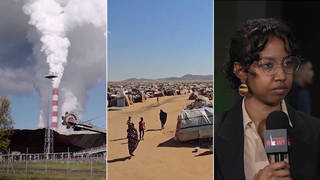
Guests
- Robert MacLeanformer air marshal with the Transportation Security Administration. He was fired in 2006 for blowing the whistle on security lapses.
- Neal Katyalformer acting solicitor general who argued the Robert MacLean whistleblowing case before the U.S. Supreme Court.
A major U.S. Supreme Court decision has upheld the right of federal employees to become whistleblowers. The case centers on former Transportation Security Administration Federal Air Marshal Robert MacLean. In July 2003, MacLean revealed to an MSNBC reporter that the Department of Homeland Security had decided to stop assigning air marshals to certain long-distance flights in order to save money, despite warnings of a potential plot to hijack U.S. airplanes. MSNBC’s report on the story sparked outcry, and the policy was quickly reversed. MacLean was fired three years later after admitting to being the story’s source. He filed a lawsuit over his dismissal, sparking a multi-year legal battle that ended earlier this week when the Supreme Court ruled on his behalf in a 7-to-2 decision. At issue was whether MacLean’s actions could be protected by the U.S. Whistleblower Protection Act, a law that protects employees if a disclosure exposes unlawful conduct, gross mismanagement or threats to public safety. We speak to Robert MacLean and attorney Neal Katyal, who argued MacLean’s case before the Supreme Court. Katyal is the former acting solicitor general of the United States.
Transcript
JUAN GONZÁLEZ: We turn now to a major Supreme Court decision upholding the right of federal employees to become whistleblowers. The case centered on a Transportation Security Administration federal air marshal named Robert MacLean. In July 2003, MacLean revealed to a reporter from MSNBC that the Department of Homeland Security had decided to stop assigning air marshals to certain long-distance flights in order to save money, despite warnings of a potential plot to hijack U.S. airplanes. MSNBC’s report on the story sparked outcry, and the policy was quickly reversed. MacLean was fired three years later after admitting to being the source of the article. He sued, beginning a multi-year legal battle.
AMY GOODMAN: Earlier this week, the Supreme Court, in a 7-2 decision, ruled on Robert MacLean’s behalf. At issue was whether MacLean’s actions could be protected by the U.S. Whistleblower Protection Act, a law that protects employees if a disclosure exposes unlawful conduct, gross mismanagement or threats to public safety.
Robert MacLean joins us now from Orange, California. We’re also joined by attorney Neal Katyal, who argued MacLean’s case before the Supreme Court. Neal Katyal is the former acting solicitor general of the United States.
Well, let’s first go to Robert MacLean. Go back to 2003. Tell us why you decided to do what you did. You were an air marshal.
ROBERT MacLEAN: Well, initially, I thought it was a mistake, because two days before, we had been given a unprecedented emergency briefing that we were going to be attacked by al-Qaeda hijackers smuggling weapons onto aircraft and targeting overseas flights, so—and we’d never had such a briefing. So when two days later we get this text message to immediately cancel all of our hotel reservations, it made no sense. So I called—
AMY GOODMAN: That meant that you would no longer be flying overseas, air marshals.
ROBERT MacLEAN: Pretty much, the way—it would have affected any flight that was about three-and-a-half hours long.
AMY GOODMAN: So what did you do?
ROBERT MacLEAN: First, I called my office to find out what’s with this text message we all got, and everybody got it across the country. And the supervisor told me that the agency had no more money, and they were going to cancel these missions indefinitely. Subsequent investigations by the inspector general and the U.S. Government Accountability Office concluded that it was going to last until the fiscal year. So it would have been two months until more funding came to the agency.
JUAN GONZÁLEZ: Now, what did you do subsequent to that to go through the normal procedures that you would have to appeal a decision like this?
ROBERT MacLEAN: I called the hotline for the Inspector General’s Office, and they asked me where I was located. So they directed me to a office in San Diego, California, where they told me that they were simply an audit office and that they did not handle the type of disclosure that I was giving them. So they gave me a number for the Oakland office, where I spoke to a criminal investigator who had been—according to what he told me, he was detailed from the Federal Emergency Management Agency, FEMA. And I explained to him what was happening. And he actually sympathized, but he said there was really nothing that could be done, these things happen, agencies run out of money, so this is—there’s nothing that he could do, and gave me sort of a lecture: “Don’t press this. You’ve got a long career ahead of you. You might”—we discussed our ages. And he said, “Just walk away.”
AMY GOODMAN: But you didn’t. Tell us what you did.
ROBERT MacLEAN: After that, I looked up—there were two journalists that there were doing really good and very responsible—and I flew myself, so I didn’t want to put myself in danger and the public that I was serving in danger, so I was careful to find these two journalists. One was unavailable, and the other I got through. He explained to me that he was in touch with senior members in Congress, who ended up being Hillary Clinton, John Kerry, Barbara Boxer and Hal Rogers. And he said he was in touch with them, and he also verified that air marshals from all across the country got the same message. And the story broke out a few hours later.
JUAN GONZÁLEZ: What was the reaction within the agency once the story broke?
ROBERT MacLEAN: Immediately, the agency denied it. They said, “That’s not what we’re doing.” And eventually, at the end of the day, they issued a press statement that they had made a mistake.
AMY GOODMAN: You would later be fired for—when it was revealed that you were the source of this information?
ROBERT MacLEAN: That’s correct.
AMY GOODMAN: On what grounds?
ROBERT MacLEAN: I was charged with one charge of unauthorized sensitive security information.
AMY GOODMAN: This is after senators held a news conference, an investigation was done, the policy was almost immediately reversed.
ROBERT MacLEAN: Yes. The plan was to go in effect five days later, so it never went into effect.
AMY GOODMAN: But you were fired three years later, when they found out who did this.
ROBERT MacLEAN: That’s correct.
JUAN GONZÁLEZ: I’d like to ask Neal Katyal, the importance of this case and the repercussions that resulted from the whistleblowing here?
NEAL KATYAL: Yeah, I mean, it’s an obviously incredibly important case. Let me start with who it’s important to. I mean, it’s obviously important to Robert and his family. Whistleblowing is a really hard thing to do. And Robert, for a decade, has been living with the consequences of it. And, you know, the chief justice’s opinion for the Supreme Court, a 7-to-2 sweeping decision in Robert’s favor, finally gives him a measure of relief from what has been a really unfortunate ordeal. So that’s just on a personal level.
But on the kind of long-term, systemic level, this is a really important decision. I mean, Congress enacted the Whistleblower Act in 1978 for precisely this kind of thing, because they knew that government agencies engage in, you know, wasteful spending, or sometimes far, far worse—mistakes that damage our national security. And it’s up to people who are employees, like Robert, to do the right thing and come forward and to say, “Hey, you can’t do this. This is wrong.” And what the administration and the TSA argued in this case was, “No, we can write our own regulations to punish people like Robert, despite what Congress said.” And what the U.S. Supreme Court said, in an opinion that transcended all kind of political lines or anything like that, seven justices signing onto it, they said, “No, you know, the whole point of the Whistleblower Act is to prevent agencies from doing this kind of stuff, these shenanigans like they did to Robert.” And, you know, look, I don’t mean to malign the TSA here, in general. There’s a lot of very responsible people there, as there are in all agencies. But I think Congress in 1978, when they wrote the rules, understood, yeah, there are a lot of responsible peoples, but sometimes there are some who aren’t, and that’s why we need the act. And so, you know, this is the U.S. Supreme Court, in a pretty dramatic fashion, coming forward to say, “Hey, agencies, you’re wrong on this stuff. It’s really Congress that set the ground rules here, and they protect people like Robert.”
AMY GOODMAN: Neal Katyal, the U.S. Court of Appeals for the Federal Circuit ruled in Robert MacLean’s favor, but the Obama administration appealed to the Supreme Court, arguing the Federal Circuit had made a serious legal mistake that would embolden further disclosures by federal employees and could put lives at stake. Can you respond?
NEAL KATYAL: Yeah, I mean, obviously, the U.S. Supreme Court rejected the Obama administration’s argument here. And I should say, I don’t hold any blame for the Obama administration in bringing the case to the Supreme Court. It was an obviously important case to bring. Don Verrilli, the solicitor general, I think, you know, made an understandable decision to bring the case to the Supreme Court. It’s one that I disagree with personally, but reasonable people can have different views of that. But at the end of the day, it’s the U.S. Supreme Court and its decision two days ago that controls this, not what the Obama administration said when asking the court to hear the case. And what the U.S. Supreme Court said is, “Hey, you know, agencies cannot be trusted with this measure of responsibility to allow them to kind of do an end run around the Whistleblower Act.” You know, the majority opinion, the chief justice’s opinion, said, basically, that’s kind of like the fox guarding the hen house, and it can’t possibly be.
And it’s an interesting thing, because in this day and age, I think so many people out there in the country think, “Oh, it’s the Roberts Supreme Court. It’s political in one way or another. You know, all these decisions are five to four.” This is a really good illustration of how this Supreme Court doesn’t always act politically one way or another, that they come together in a bipartisan fashion. And it’s a good reminder. I mean, last year, the chief justice did something, and his colleagues did something really kind of surprising: They agreed in roughly two-thirds of the cases unanimously. You’d have to go back to the year 1940 to find that level of agreement. And Robert’s case wasn’t totally unanimous—it was seven to two—but it was still seven justices ruling against the government in a national security case. That’s a pretty rare thing to happen.
JUAN GONZÁLEZ: And I’m wondering, in terms of the impact of this case on whistleblowers, not just in the federal government, is that potentially—this case could potentially be cited, because at local state government levels, there are government employees who see major problems arising within their agencies, sometimes affecting public safety. Will this embolden them at the local level, as well?
NEAL KATYAL: Well, I mean, I think different states have different whistleblower acts, and they work in different ways. The chief justice’s opinion was careful to really talk about the federal Whistleblower Act and federal employees. So, you know, strictly speaking as a legal matter, I don’t think that it changes the game with respect to states.
But I think what Robert did here is inspiring to all Americans. I mean, I don’t think that whistleblowing is something that should be done lightly. It should only be reserved for a circumstance like this. But in a circumstance like this, in which, you know, the public’s lives are at danger and the agency is doing the wrong thing, I think this U.S. Supreme Court said someone like Robert’s got to come forward. That’s what the system depends on. And, you know—
AMY GOODMAN: The implications—we just have 10 seconds—for Ed Snowden?
NEAL KATYAL: There are no implications for Snowden. I think that’s a very, very different case.
AMY GOODMAN: And let me ask—let me end with Robert. What does this mean for you? You were fired years ago. Do you get reinstated?
ROBERT MacLEAN: I feel—well, I believe not only the Merit Systems Protection Board, in its last decision, agreed that I had a reasonable belief of wrongdoing occurring, but also the TSA. When I made my—
AMY GOODMAN: We have four seconds.
ROBERT MacLEAN: That’s all I can say in four seconds.
AMY GOODMAN: But thank you very much. A very important case. Robert MacLean and Neal Katyal.












Media Options